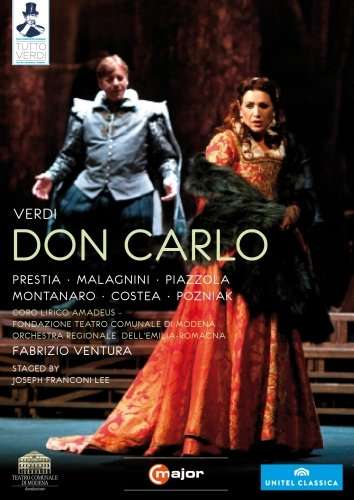|
Back
07/07/2013
Giuseppe Verdi: Don Carlo
Mario Malagnini (Don Carlo), Cellia Costea (Elisabeth de Valois), Simone Piazzola (Rodrigo, Marquis de Posa), Giacomo Prestia (King Philip II), Alla Pozniak (Princess Eboli), Luciano Montanaro (The Grand Inquisitor), Irène Candelier (Tebaldo, A Celestial Voice), Paolo Buttol (A Monk), Giulio Pelligra (Count Lerma), Marco Gaspari (A Royal Herald), Coro Lirico Amadeus-Fondazione Teatro Comunale di Modena, Stefano Colò (Chorus Master), Orchestra Regionale Dell’Emilia-Romagna, Fabrizio Ventura (Conductor), Joseph Franconi Lee (Stage Director), Alessandro Ciammarughi (Set and Costume Designer), Nevio Cavina (Lighting Designer), Marta Ferri (Choreographer), Tiziano Mancini (Video Director)
Recorded live at the Teatro Comunale “Luciano Pavarotti” di Modena (October 15, 17, 19 and 21, 2012) – 215 min. (including bonus introduction)
C Major Entertainment # 724608 (distributed by Naxos of America) – Booklet in English, German, French and Italian – Subtitles available in Italian, English, German, French, Spanish, Chinese, Korean and Japanese

   
Lying within the mantle of mature works is Don Carlo, one of Giuseppe Verdi’s most sophisticated and grand of all operas. Indeed, “grand” since its premiere appeared on March 11, 1867 at the Paris Opéra where staging requirements had inflexible constraints, namely five acts and compulsory ballet. One of the most complex operas to evolve and one with multitudinous versions, this production sticks to the 1886 ‘Modena Version’ with generous opulence by Joseph Franconi Lee. Multi-platform scaffolding (initially making one think we’re inside Tosca’s Sant’Andrea della Valle) parenthesizes the elaborate scenic backdrops while helping project volume during group numbers.
On balance, this Don Carlo has a commendable cast in terms of acting and vocal profundity, and it might just be to the credit of Alessandro Ciammarughi’s richly detailed costuming that brings out the best in all the characters. Mario Malagnini and Simone Piazzola engage with superb precision during the ‘Mates Duet’, Alla Pozniak has her shiniest moment during “O don fatale” although she troubles with flatness in her thirds during the ‘Veil Song.’ Cellia Costea sings in the most comfortable range as Elisabeth; her projection is firm and resolute while her husband, King Philip, sung by Giacomo Prestia has issues with degreed wobbliness yet manages to deliver a fine “Ella giammai m’amò!”. Candelier’s perkiness lights up the stage as Tebaldo even though the notes are too low at times for her voice to carry.
With all the pomp, circumstance and attention to lavishness, it is, however, a bit of an irony to see The Grand Inquisitor appear in Act IV dressed in humble garb. Additionally, one would expect tightly curbed gesticulations, saving the ominous presence to feed through the voice, but Luciano Montanaro’s physical mannerisms make him more secular and “approachable.” Despite Fabrizio Ventura’s riveting orchestral response, the effect is diluted by Lee’s weakened interpretation… the fear factor behind The Grand Inquisitor is simply lacking.
Several creative cues are in the works in the lighting department by Nevio Cavina: King Philip and his religious entourage appear and disappear within an alcove of the Valladolid cathedral to create a barrier to the non ecclesiastics, the two silhouetted men hung at the stake while bathed in a vibrant hue of blood red closing the auto da fé is chillingly powerful, attendants in the Queens’s Gardens are richly illuminated reminiscent of a Raphael painting.
Although many recordings exist of Don Carlo, this Unitel Classica production has mastered quite nicely all artistic disciplines in one cohesive production.
Christie Grimstad
|